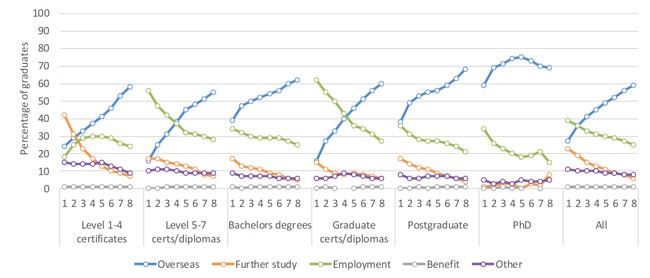New report maps foreign graduate outcomes in New Zealand
For most international students, employment-related goals - the chance for new career opportunities or for advancement in their current career path - are the primary motivations for study abroad. This is why international educators and students alike pay such keen attention to shifts in employment policy and opportunity in major destinations. And time and time again, we see that when post-study work rights are expanded, or visa processes streamlined in some meaningful way, such measures provide a powerful boost to the attractiveness of a given study destination.
But what about employment outcomes for international graduates? How many stay to pursue international work experience? How many return home and when do they do so? The answers to these questions are not always clear cut - indeed, as in the UK, they can be the subject of considerable debate and political tension.
This is partly what makes a recent study in New Zealand so interesting. Commissioned by the Ministry of Education and published in January 2017, Moving places: Destinations and earnings of international graduates is a first-of-its-kind effort to map the stay rates and employment outcomes of international graduates in New Zealand.
“The number of international students who complete a qualification in New Zealand has been increasing at most qualification levels in recent years,” says the report. “Knowing what these students do after they complete a qualification is important. It tells us whether they return overseas or continue on to do further study once they have finished their first qualification, and which graduates enter our labour market and contribute to New Zealand’s economy once they have completed their studies. Students who return overseas after they complete their studies still make an important contribution to New Zealand, culturally, academically, and economically. Their economic contribution is both direct (for example, through fees they pay to providers to study in New Zealand and other expenditure they make while in New Zealand) and indirect (for example, links formed between international students and New Zealanders that may create business opportunities in the future).”
The study examines graduate outcomes as of the 2012 and 2013 tax years for up to eight years post-study - that is, it reaches back to students who began their studies in New Zealand as early as 2003. It finds that two-thirds (66%) of all first-time visa holders have returned overseas five years after obtaining their first student visa (FSV). But it notes as well that there are significant differences in return rates between those who complete a qualification in New Zealand and those who do not.
Nearly nine in ten students (87%) who do not complete a qualification within five years of their FSV return overseas five years after their first visa. In contrast, the return rate for all international graduates is 49% at the five-year mark from graduation and 59% after eight years.
The study notes varying percentages of retention and return for graduates in different age groups and for those completing different levels of qualification in New Zealand (i.e., below-degree, degree, and advanced degrees). And the report maps a number of outcomes for those various levels of qualifications for up to eight years after graduation. As reflected in the charts below, these post-graduation paths include further study, employment, or returned overseas.

















